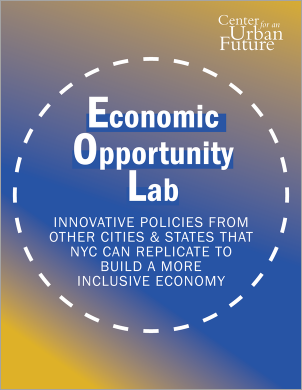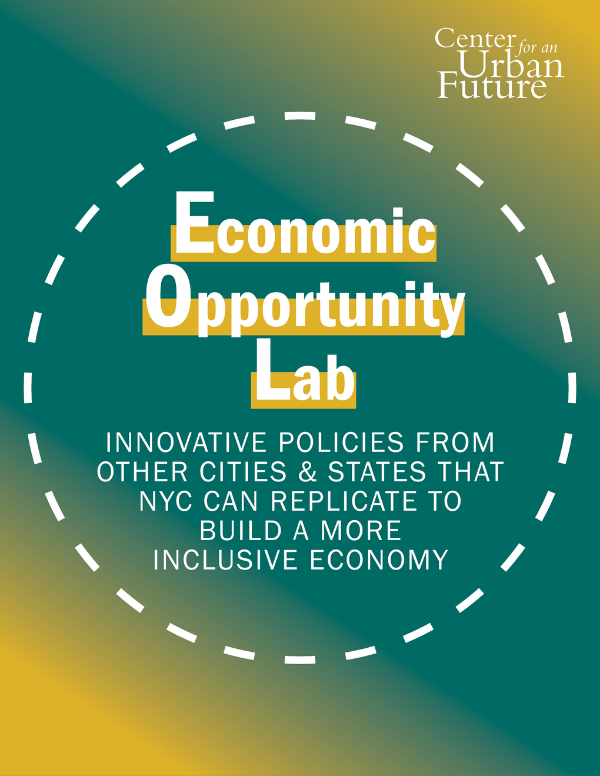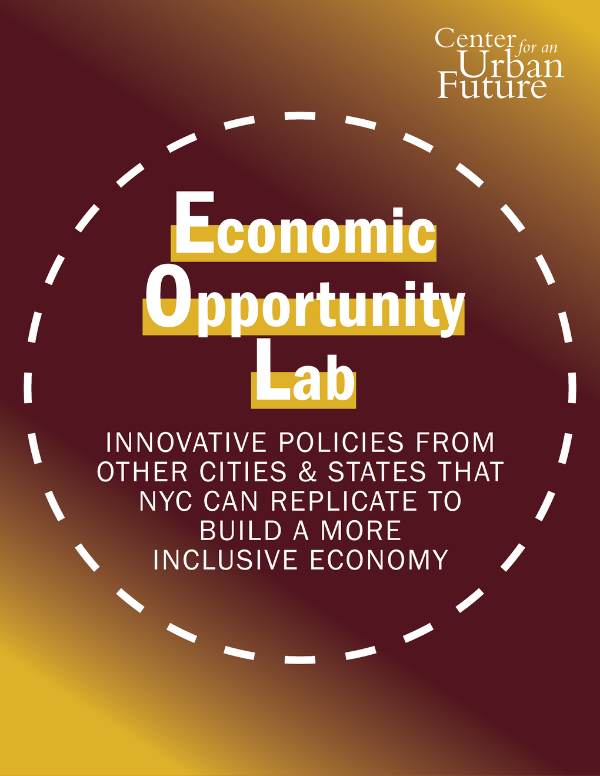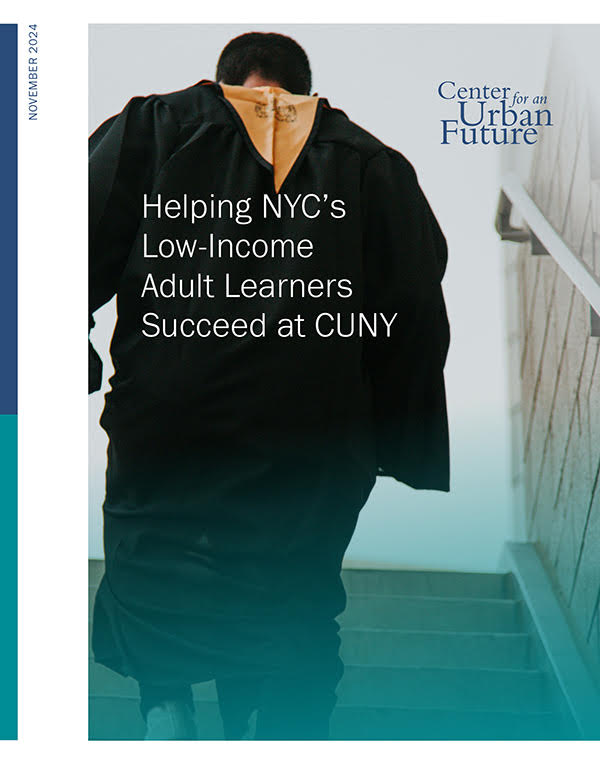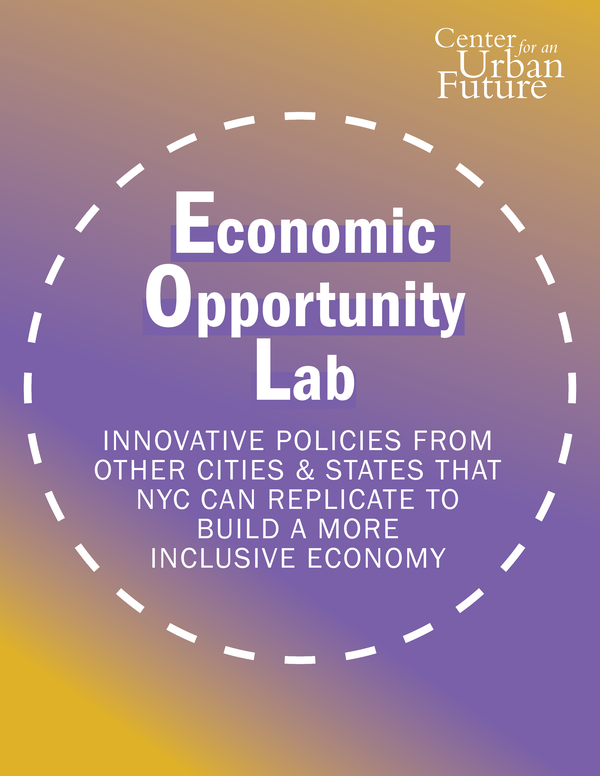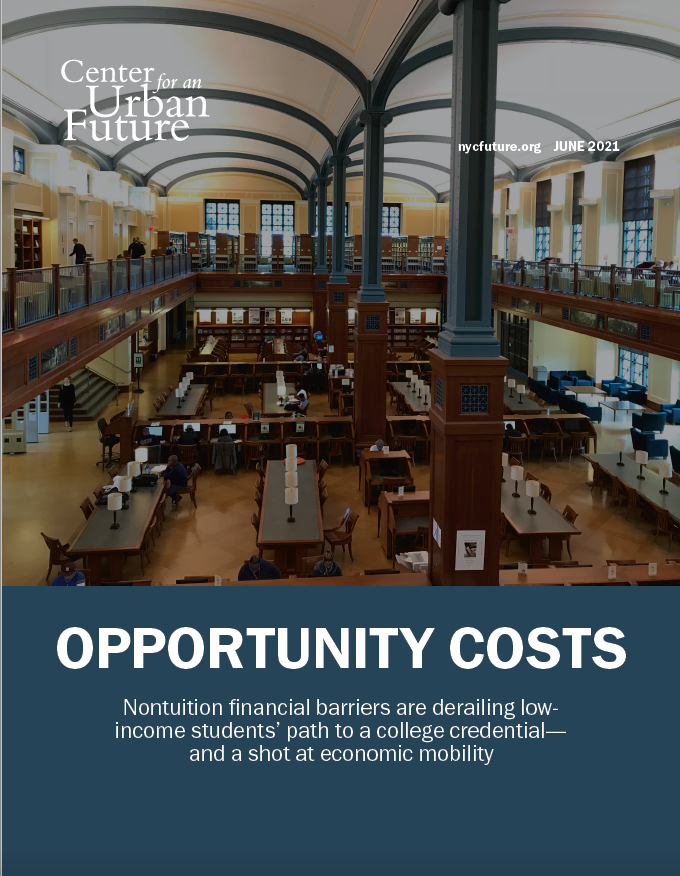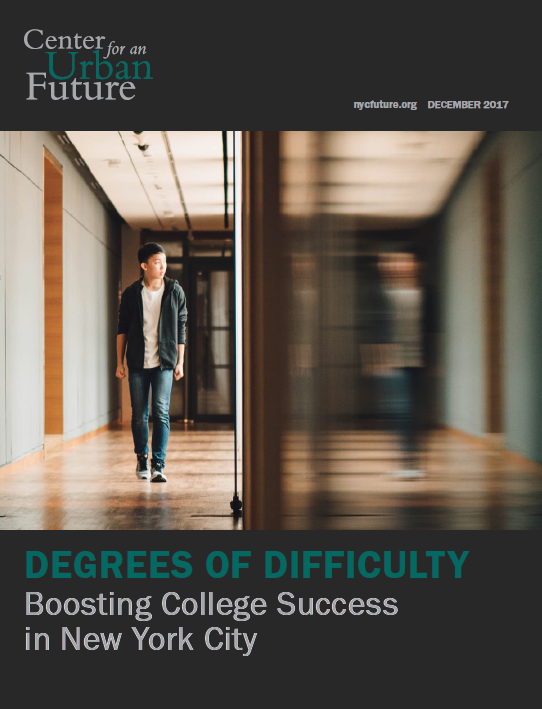
To help more New Yorkers access the well-paying jobs that are powering the city’s economic recovery from the pandemic, city leaders will have to make significantly more progress in boosting college attainment. This need has only become more urgent in recent months, as industries with thousands of well-paying jobs that typically require a college credential have approached or even exceeded their pre-pandemic jobs totals—including tech, healthcare, and the creative industries—while industries with more accessible jobs—such as hospitality, retail, and manufacturing—lag far behind.
Although there are many steps that Mayor Adams and the City Council can take to help boost college completion rates citywide, one of the first should be to implement policies that can enable the nearly 700,000 working-age New Yorkers with some college credits but no degree to return to college and complete a credential. Indeed, tens of thousands of these New Yorkers have already made significant progress toward a credential and are in sight of the finish line. Policymakers can help recruit them back to earn their remaining credits, while investing in reforms that make returning to college easier for working adults.
Fortunately, New York City’s incoming leaders have a playbook to follow: Tennessee’s Reconnect initiative.
Tennessee launched the program in 2017 after recognizing an opportunity similar to New York’s: more than 900,000 adults in Tennessee had some college credits but no degree.1 The Reconnect initiative was created to entice as many of these adults as possible to re-enroll in community colleges and earn the credential that eluded them before. Designed to meet the unique challenges facing returning adult students, the program includes “last dollar” funding to close financial aid gaps, pre-enrollment services to help encourage and prepare prospective students to return, and hands-on counseling focused on meeting the unique needs of older students juggling work and family responsibilities.
In its first year, Tennessee Reconnect proved more successful than anticipated, with roughly 31,000 adults applying to program. Moreover, 61 percent of participating students earned a degree or stayed enrolled and more than 2,000 students completed a credential.2
A similar re-enrollment effort in New York would help the city and state in multiple ways. In addition to the economic imperative for New York’s post-COVID recovery, helping more working adults return to college and earn a credential is a significant equity issue. Fully 14 percent of all working-age New York City residents, or 670,271 people, earned some college credits but never finished. This includes 21 percent of working-age Black New Yorkers, 17 percent of Hispanic New Yorkers, 11 percent of white New Yorkers, and 9 percent of Asian New Yorkers. Black and Hispanic women comprise 35 percent of working-age New Yorkers with some college but no degree, despite making up just 26 percent of all working-age New Yorkers.3
“It’s about equity,” says Angie Kamath, dean of New York University’s School of Professional Studies and a former University Dean at CUNY for continuing education programs. “In terms of who has the ability and privilege to be a full-time student, to be really focused on education, to get to the finish line. If we don’t address it now—if we don’t actually correct for inequities and get people credentialed in ways that matter to the marketplace and employers—what we are doing is ensuring that the equity gaps get bigger and bigger.”
Even before the pandemic hit, economic opportunity in New York City was split along sharp lines of college attainment. Of the 50 occupations that pay an entry-level salary over $50,000 with the highest projected growth over the next ten years, 48 typically require a postsecondary credential.4 That has proven to be a major obstacle to economic inclusion in a city where just 20 percent of Hispanic New Yorkers, 27 percent of Black New Yorkers, and 45 percent of Asian New Yorkers hold a bachelor’s degree, compared to 64 percent of white New Yorkers.5
The economic fallout from the pandemic has further exacerbated these divides. Jobs that are typically accessible to candidates without a college credential were hit much harder by the pandemic-induced economic crisis and continue to be threatened by the accelerating pace of automation. At the same time, many thousands of New Yorkers are just a few courses away from an associate’s degree or other credential that can significantly boost potential earnings: for instance, working-age New Yorkers with an associate’s degree earn $7,000 more annually than peers with some college, but no degree.6
Both the city and state have made strides in recent years to get more New Yorkers to college graduation day. CUNY ASAP, an accelerated associate’s degree program, provides students with hands-on advising, free textbooks and MetroCards, and other supports, and has led to graduation rates that are double CUNY’s community college average. In 2017, the state announced the Excelsior Scholarship Program, which offers additional tuition assistance to SUNY and CUNY students from families who make less than $125,000. And most recently, CUNY forgave nearly $95 million in student debt through the Comeback Program, which eliminates debt for more than 52,000 students facing financial hardship from the COVID-19 pandemic.
Yet what’s still missing is a concerted citywide effort to bring back adult learners and provide them with the tools they need to succeed.
In the wake of the pandemic, New York City has a major opportunity to rebuild a more equitable economy by addressing college completion—in particular, for those New Yorkers who have already made progress toward the finish line. The city’s leaders should implement a program with the ambition and scale of Tennessee Reconnect and help the nearly 700,000 working-age New Yorkers with some college but no degree to return, complete a credential, and become better prepared to participate in the city’s economic future.
The Policy
In 2017, Tennessee was home to about 900,000 residents who had obtained college credits but never graduated, which posed a significant barrier to attaining the middle-wage jobs emerging in growing cities like Nashville and Chattanooga. For policymakers and local leaders, boosting college success became an urgent issue of economic competitiveness. “It was a workforce imperative,” says Laura Ward, senior vice president for talent development at the Nashville Chamber of Commerce. “Workforce is top of mind for every single employer that’s looking to relocate or expand here. It isn’t, ‘Can I find office space?’ It’s, ‘Are there going to be people to fill jobs we create?’”
The growing mismatch between the educational credentials held by Tennessee’s workforce and the growing demand from employers for highly skilled workers helped spark the state’s Drive to 55 initiative: an effort to equip 55 percent of Tennessee residents with a college degree or certification by 2025. Tennessee Reconnect is integral to that effort. In 2017, the state invested $10 million in a “last dollar” scholarship for any adult learner enrolling in community colleges. For those returning, the scholarship pays for the remaining cost of tuition for an associate’s or technical certificate after state and federal financial aid is factored in.
Since its launch nearly five years ago, Tennessee Reconnect has evolved from a scholarship to a suite of strategies responding to the unique challenges faced by adult learners. These so-called nontraditional students—or those who are not recent high school graduates, not living with their parents, or have a child at home—now comprise three-quarters of the entire postsecondary student population, yet are three times more likely to drop out than “traditional” students.
To reengage these students and help them earn a credential, Tennessee officials recognized the need to both encourage students’ return and address the structural issues and competing demands—like work, childcare, and other family responsibilities—that lead to higher rates of drop out in the first place.
“There are a lot of reasons to not go back to school [if you’re a working adult],” says Jessica Gibson, chief success officer at the Tennessee Higher Education Commission, who plays a lead role in Tennessee Reconnect. The multiple steps needed to reenroll can by themselves be overwhelming, she says, and with campus offices usually only open during workday hours, returning students can feel left out.
Before enrolling in Tennessee Reconnect, those interested take a ten-question survey, which offers personalized recommendations on potential colleges, funding eligibility, and opportunities to clear outstanding debts. A cost calculator and transfer check, which analyzes past transcripts and credits, is available to the public. Additional pre-enrollment counseling allows adult learners who might be hesitant to invest time and money understand exactly what will be needed to earn a credential—and the shortest path to getting there.
“Tennessee really focused on identifying folks and inviting them back by saying, ‘Let us quantify for you how much more you need to earn this credential,’” says Ivy Love, a senior policy analyst focused on community colleges at New America’s Center on Education & Labor, an education policy think tank.
Students interested in returning are then connected to a navigator, who helps guide them to graduation day. Navigators help students apply for financial aid, ensure they’re aware of eligible benefits, and regularly check in on progress. “What we’re seeing is that [navigators] help prevent stop-outs where people in a situation just had to leave,” explains Gibson. “It’s rarely academic that someone is leaving college as an adult. It has to do with other things.”
When the program launched, state education officials projected that they’d receive 10,000 applications. In the end, they received four times that amount, and saw a 30 percent increase in adult student enrollment. Out of 41,587 applicants, 71 percent were women, and 50 percent had an annual income less than $50,000. The majority planned to work while enrolled and had children at home. The average age was 34.7
Over time, Tennessee Reconnect—which now has an annual budget of roughly $22 million—has evolved to meet new needs. The Reconnect Success Collaborative now enlists local and state agencies, nonprofits, and community groups to help with recruitment. State agencies, like the Departments of Labor and Human Services, engage with residents seeking unemployment and food stamps through “ambassadors.”
Municipal governments in the state have also stepped up to expand support for returning students. In 2019, the city of Nashville launched NashGrad, a $1 million program offering wraparound services, including money for groceries and gas as well as flexible scheduling, to reconnecting students enrolled at Nashville State Community College. There, the Nashville Chamber of Commerce partnered with education officials to set up Reconnect Cafe, the only on-campus space of its kind offering walk-in appointments with navigators. When administrators there saw a slight drop in enrollment in the second cohort (2019 to 2020), they investigated.
“Many adults were excited about free college, but the reality of balancing work was tough,” says Dr. Shanna Jackson, president of Nashville State. “Many also didn’t know you had to complete FAFSA each year to qualify.” The Tennessee Higher Education Commission worked with community colleges to create Nudge to Reconnect, a set of targeted reminders for students to stay on track. After the initiative’s first year, which overlapped with the pandemic’s start, they saw the returning student population increase by 5 percent.
As in New York, the pandemic has taken a toll on Tennessee’s community colleges, with enrollment dropping nearly 12 percent from 2019 to 2020. But experts say that the program has helped position Tennessee’s higher education system to rebound from the enrollment declines spurred by the pandemic. “We had 42,000 applications for Tennessee Reconnect when our economy was good,” says Gibson. “It’s one of those situations where if it’s communicated well that there’s a grant program and support is offered, people will come.”
The Challenge
In 2019, New York City was home to 670,291 residents between the ages of 25 and 64 who have completed some college credits but never earned a degree.8 As Tennessee has demonstrated, it is eminently possible to enable a significant share of these adults to return to college and complete enough credits to earn a credential. But it will require New York to create new supports for older students, most of whom will only be able to do so while still working and juggling an array of other responsibilities.
To date, New York City and State have yet to come together with funding or programs to adequately tackle this challenge. Financial aid largely leaves out part-time students, who make up the bulk of adult learners. CUNY does not have enough resources for ample pre-enrollment counseling, which could help adult learners determine a game plan and find the best route to a credential. And staffing challenges mean that few programs can offer the sort of flexible scheduling—a blend of nights, weekends, and virtual classes—that many working adults need to fit college into their busy lives.
1. College financial aid isn't set up for part-time adult learners.
With competing demands at work, family responsibilities including childcare and elder care, and a mountain of nontuition costs—including technology, books, and transportation—most working-age adults with some college but no degree could only consider returning to college in a part-time capacity. New York State’s Tuition Assistance Program (TAP) offers aid to part-time students, but strict eligibility requirements mean that very few students actually receive it. Likewise, just 4.7 percent of community college students receive any financial support under the separate Aid for Part-Time Students program—for an average of just $743 per student.9 In addition, the state’s last-dollar Excelsior Scholarship, which helps students from families earning up to $125,000 annually to attend a public college tuition-free, requires a full-time course load. Federal Pell grants cannot be used on short-term degree programs, which many working adults might find otherwise most attractive. Lastly, adult learners may have burned through aid from previous period of enrollment, or have outstanding debts, which present an additional barrier to reenrolling.
Various fee-forgiveness initiatives and CUNY’s Comeback Program are great starts, says Terri Taylor, a strategy director at the Lumina Foundation, an independent funder of higher education initiatives, including Tennessee Reconnect and several CUNY programs. But providing that “last dollar” between what financial aid covers and the true cost of attendance—specifically for part-time students—can be the crucial difference maker in whether or not adult learners even entertain the idea of coming back.
“For adult learners, the financial aid system doesn’t quite work,” says Taylor. “These are things that you could correct for through the design of a program like Tennessee Reconnect.”
2. Lack of pre-enrollment counseling leads to stop-outs later on.
When an adult decides to return to finish college, their preexisting college credits should be evaluated to determine the maximum number of credits that can be carried over to a new degree-granting program--and which additional courses must be completed. At CUNY, this information is only available to students after they’ve applied and are accepted into a program. For adults who may have other obligations, like childcare or full-time work, discovering these details late in the process can be yet another reason to stop-out.
Experts say that robust pre-enrollment support is critical to helping adult learners maximize credit for the classes they have already completed, identify programs that are the best match for their existing credits and career goals, and receive as much financial support as possible while earning a degree. A physical space, like Tennessee’s Reconnect Cafes, could provide a welcoming space where adults can explore their options and receive unbiased guidance before enrolling. Some campuses do have resources—Kingsborough Community College, in Brooklyn, has one pre-enrollment coach, for example, and informational partnerships with branch libraries exist—but CUNY officials say staffing capacity limits reach and scope.
Boosting pre-enrollment counseling requires “learning, training, and time,” says Dr. Joanne Russell, senior vice president for academic affairs at KCC. “We’d have to train more people to call prospective students, find them, and really bring them back.”
3. Adult learners need flexible scheduling—and often struggle to get it.
Despite adult learners making up roughly one-quarter of all CUNY students, most classes are scheduled at times that make them inaccessible to New Yorkers eager to return to school but juggling work and family responsibilities. At most of CUNY’s two-year colleges, classes overwhelmingly take place during the day, which may work for an 18-year-old enrolled full time, but is often tougher for an older students with children at home. Experts suggest that in order for a reconnect-style program to succeed, students need an array of degree-granting pathways that can be completed through a combination of evening, weekend, and online classes.
As the pandemic has made clear, online synchronous classes will undoubtedly be part of the future of education. But as it stands, many CUNY colleges and programs lack the faculty resources to offer online classes alongside evening and weekend classes to better match the schedules of adult students. One promising pilot program, KCC Flex, exists at Kingsborough Community College, where nine associate’s degree programs are now available fully online. Students can then continue online at CUNY’s School of Professional Studies, where it is possible to complete a four-year degree virtually. But the same resources do not exist university-wide.
“We realized that less than a third of the student population was over the age of 25, and it certainly should be a larger percentage,” says Dr. Russell of Kingsborough. “So we started [KCC Flex] as an equity issue, realizing that we needed to serve our adult students better . . . and that flexibility has been so important.”
Conclusion
To ensure an inclusive economic recovery from the pandemic, city leaders will have to do much more to help boost college attainment. For many of the nearly 700,000 working-age adult New Yorkers with some credits but no degree to show for it, the finish line may be closer than they realize. Policymakers can help many of these New Yorkers gain better access to the well-paying jobs that are powering the city’s economic recovery by making it easier and cheaper to return to college and finish a degree.
New York City alone is home to nearly as many residents with some college but no degree as the entire state of Tennessee—and the city’s annual budget, at $102.8 billion, is more than double that of Tennessee’s ($41.8 billion). Given the enormity of the challenge that New York City policymakers face in designing policies to ensure an equitable economic recovery from the pandemic, a relatively modest investment on the scale of Tennessee’s Reconnect initiative is well within the city’s means—and could be a particularly efficient way of helping expand economic opportunity in a city where the vast majority of newly created, well-paying jobs are requiring at least some form of postsecondary credential.
Tennessee Reconnect offers New York policymakers a powerful model that specifically target the gaps for adult learners. By funding “last dollar” scholarships accessible to part-time students, providing robust pre-enrollment counseling, and offering flexible scheduling in a broad range of high-demand degree-granting pathways, city leaders can work with CUNY to create an environment that better supports all adult learners. With these adjustments and supports in place, Mayor Adams and CUNY should launch a citywide “CUNY Reconnect” campaign—through government agencies, public libraries, employers, and other key stakeholders—to spread the word that New York City is serious about helping working adults with some college but no degree to return to CUNY and earn a credential.
Endnotes
1 Tennessee Reconnect Act, https://www.tn.gov/content/tn/nexttennessee/tennessee-reconnect/tennessee-reconnect-one-pager0.html.
2 Tennessee Reconnect Annual Report 2020, https://www.tn.gov/thec/research/tnr-annual-report.html.
3 Center for an Urban Future analysis of data from the U.S. Census Bureau 2014-2018 American Community Survey five-year estimates.
4 Center for an Urban Future analysis of data from the New York State Department of Labor Long Term Occupational Employment Projections, 2018-2028.
5 Center for a Urban Future, “Building an Inclusive Economy in New York City: Boosting College Attainment,” January 2021, https://nycfuture.org/research/boosting-college-attainment.
6 Center for an Urban Future analysis of data from the U.S. Census Bureau 2015-2019 American Community Survey five-year estimates.
7 Tennessee Reconnect Annual Report 2020.
8 Center for an Urban Future analysis of data from the U.S. Census Bureau 2015-2019 American Community Survey five-year estimates.
9 Center for an Urban Future, Opportunity Costs, June 2021, https://nycfuture.org/research/opportunity-costs-nontuition-barriers.
